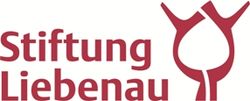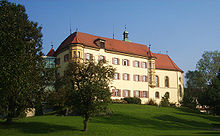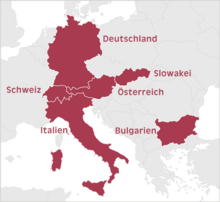Liebenau Foundation
| Liebenau Foundation
|
|
|---|---|
| legal form | Church foundation under private law on the basis of the Catholic Church |
| founding | 1870 |
| Seat | Meckenbeuren - Liebenau |
| management | Berthold Broll (since 2002) Markus Nachbaur (since 2005) Prelate Michael HF Brock (since 2011) |
| Number of employees | 7143 (as of: 2018 annual report) |
| Branch | Social, health and education companies |
| Website | stiftung-liebenau.de |
The Liebenau Foundation , based in the Liebenau district of Meckenbeur, is an independent social, health and education company that was created out of Christian motivation and started its work in 1870. It operates in Germany, Austria, Italy, Switzerland, Bulgaria and Slovakia. A total of 7131 employees work in the facilities of the Liebenau Foundation, which support, care for or treat several thousand people every year. She works closely with the Hospital for the Holy Spirit Foundation and the Helios Foundation for Life in Old Age.
task
According to § 1 of its statutes, the Liebenau Foundation is a "church foundation under private law on a Catholic-church basis" . In accordance with the purpose of the foundation, it offers a wide range of facilities, services and community-oriented offers in care for the elderly and help for people with disabilities (assistance for the disabled ), in the health sector , in the education sector and in child and youth welfare.
history
The initiative for the establishment of the Liebenau Foundation goes back to the Tettnang chaplain Adolf Aich , who bought the Liebenau Castle in 1870 and founded a “care and preservation institution” together with 13 Tettnang citizens. It should become a “refuge” for people with incurable diseases and disabilities. In the early years, the chaplain worked there with six merciful sisters (today: Franciscan Sisters from Reute , who worked in Liebenau until 1975). In 1895 the institution was expanded to include a newly built house, the St. Josefs House. Thus, by the end of the 19th century, more than 400 people could be looked after. The inflation after the end of the First World War almost forced the institution to close. In 1925 the second large living area for people with mental disabilities was built in Rosenharz near Bodnegg . Two years later another house was bought in nearby Hegenberg.
time of the nationalsocialism
From July 1940, 501 residents of the institution were murdered in the Grafeneck killing center and the Hadamar killing center as part of the National Socialist euthanasia program . The prison management managed to save some people by hiring them as agricultural and domestic assistants. Few residents could be released to join their families. Before the T4 campaign , over 1000 people were still living in the Liebenau Foundation, after that it was only a little more than 500.
Some of the institute's buildings were then used as a military hospital by the Wehrmacht . At the end of 1940, empty buildings belonging to the Liebenau Foundation were fenced in and used as an internment camp for female civil prisoners and children. These were foreigners from "enemy countries" or persons from occupied countries who had dual citizenship: They were all intended for an exchange of civilian prisoners. Among them were women of Jewish descent, so-called exchange Jews . Even after the establishment of the Bergen-Belsen residence camp, Liebenau remained an internment camp for female exchange prisoners if their foreign citizenship was beyond doubt. There is evidence of exchanges with people from Liebenau for at least 1942 to 1945
The exchange campaigns were prepared by the Legal Department and the Political Department of the Foreign Office , the Reich Security Main Office Section II B 4 (later IV F 4) Aliens Police and Border Security and the Eichmann Department . The guards consisted of a handful of men who were subordinate to a government inspector from the Württemberg Ministry of the Interior. The care was comparatively good, as most of the prisoners regularly received packages from the International Red Cross .
post war period
After the Second World War , the charitable foundation work was continued in full. In 1952 the Don Bosco School (special education and advice center) was built and the workshops for people with disabilities were built in the late 1960s. The facility was renamed in 1970 from “Liebenau Sanatorium and Nursing Home” to the Liebenau Foundation . In 1971 the institute for socio-educational professions was founded in Ravensburg and a year later a children's and youth village was opened in Hegenberg. Two years later, the medical department in Liebenau Castle became a specialist hospital. This is how today's St. Lukas Clinic emerged . In 1980 the Adolf Aich vocational training center opened in Ravensburg , a facility for the professional and social rehabilitation of young people with learning disabilities and its own special vocational school.
The Liebenau Foundation has also been involved in elderly care since 1990. In order to create and permanently secure jobs for people with and without disabilities, the Liebenau Foundation established several commercial subsidiaries and foundation companies in the following years and decades. These offer a wide variety of services and products: u. a. Catering, textile and building services, gardening and landscaping, forestry and agriculture.
The Liebenau Foundation has also been involved outside of Germany since the end of the 1990s and is currently active with its offers in six Central and Southern European countries. The years since the turn of the millennium have been characterized by strong growth in most areas of activity as well as national and European expansion. E.g. The Liebenau Family Network was set up with more than 60 services, aids and offers aimed at families with children of preschool and school age. In addition to its actual activities, the Liebenau Foundation also fulfills its social responsibility at national and European level. As a member of the Brussels Circle, an association made up of 13 non-profit social and health management companies, and the Network: Social New Shaping (SONG), she is actively involved in shaping the political framework in the social field and calls for social solidarity with her target groups.
organization
The Liebenau Foundation acts as a holding company for the following non-profit subsidiaries ( gGmbH ) in Germany :
- Liebenau Teilhabe non-profit GmbH (focus: help for people with disabilities)
- Liebenau services for people non-profit GmbH (focus: help for people with disabilities)
- Liebenau Kliniken non-profit GmbH (focus: medical care for people with intellectual disabilities)
- Liebenau therapeutic facilities non-profit GmbH (focus: medical care for people with intellectual disabilities)
- Liebenau Lebenswert Alter non-profit GmbH (focus: care for the elderly, care and living spaces)
- Liebenau Leben im Alter non-profit GmbH (focus: care for the elderly, care and living spaces)
- Liebenau Berufsbildungswerk non-profit GmbH (focus: vocational and social rehabilitation of young people with learning disabilities)
The Liebenau Foundation acts as a holding company for the following foreign non-profit subsidiaries :
- Liebenau Austria non-profit GmbH (Austria / focus: geriatric care)
- Liebenau Austria Service non-profit GmbH
- Liebenau Austria social centers non-profit GmbH
- Liebenau Switzerland non-profit corporation (focus: care for the elderly)
- Liebenau Italy non-profit GmbH (focus: geriatric care)
- Liebenau Bulgaria EOOD
Service providers and foundation companies of the Liebenau Foundation:
- Liebenau Service GmbH (focus: building and textile services, catering, organizational consulting and training)
- Liebenau Gebäude- und Anlagenservice GmbH (focus: services and handicrafts in the fields of electrical, sanitary and heating)
- Liebenau Consulting and Entrepreneurship GmbH (focus: service providers in the areas of IT services, accounting and payroll accounting)
- Liebenau Objektservice GmbH (focus: domestic services)
- Forestry operations (focus: forest-related services such as planting, forest maintenance and timber harvesting)
- Liebenauer country life (areas: gardening, fruit and wine growing, agriculture, gardening and landscaping, shop and catering)
The Liebenau Foundation is also involved in the following social institutions:
- Institute for Social Professions gGmbH (IfsB) (focus: training, further education and training)
- CSW - Christliches Sozialwerk gGmbH in the diocese of Dresden-Meißen (focus: integration, child and youth welfare)
- Franz von Assisi gGmbH (focus: child and youth welfare)
- Society for Developmental Psychiatry and Integration gGmbH (focus: child and adolescent psychiatry)
- Casa Leben im Alter gGmbH (Austria)
- Bulgarian-German Social Service St. Andreas eV (Bulgaria)
- Fondazione S. Elisabetta (Italy)
- SMO Reha GmbH (Austria, focus on rehabilitation)
Fields of activity
The Liebenau Foundation is a social, educational and health company with a high level of expertise and sustainable profitability on a church-Catholic basis. It cooperates with partners at home and abroad and advocates social solidarity with its target groups. It works in partnership, enables participation, strengthens self-help and establishes support networks.
Care and habitats
The Liebenau Foundation has residential and care offers for older and very old people. The aim is a self-determined life through outpatient, inpatient and civic assistance.
Participation
People in need of support are accompanied in their individual development, integration into society and work.
health
People with mental and physical disabilities receive medical and therapeutic care in a specialist hospital, a psychiatric day clinic and outpatient departments.
education
The foundation runs schools for children with disabilities, trains young people with special needs and helps them start or re-enter the labor market.
family
Families of children with serious illnesses and disabilities are supported by accompanying measures and protected against overload.
Service and foundation companies
In the service and foundation operations of the Liebenau Foundation, people work with and without a need for support. Private customers, companies or municipalities are the customers.
The foundation is a member of the network for easy language and maintains a trained review group for easy language, which checks the content of texts for their comprehensibility and translates them according to the rules of easy language . Some of the Foundation's publications appear in plain language.
literature
- Michael Schnieber: In our midst - people. Liebenau Foundation. Senn, Tettnang 1995, ISBN 3-88812-169-8 .
- Berthold Broll, Helmut Staiber, Dieter Worrings: Shaping relationships in freedom. Experiences, points of view and perspectives from the Liebenau Foundation. Lambertus, Tettnang 1992, ISBN 3-78411-403-2 .
- Anna Grebe: Photographic normalization. On the socio-medial construction of disability using the example of the Liebenau Foundation's photo archive. Transcript, Bielefeld 2016, ISBN 978-3-8376-3494-5 .
Web links
Coordinates: 47 ° 42 ′ 33.5 ″ N , 9 ° 36 ′ 17.3 ″ E
- Official website of the Liebenau Foundation
- Organization chart of the Liebenau Foundation
- Annual report 2017 of the Liebenau Foundation
Individual evidence
- ↑ Carolyn Gossage: On odyssey: Seven Canadian women on the move in the "Third Reich" . ISBN 978-3-861-53545-4 , Berlin p. 101.
- ↑ Alexandra-Eileen Wenck: Between human trafficking and the “final solution” - The Bergen-Belsen concentration camp. Paderborn 2000, ISBN 3-506-77511-1 , p. 390.
- ↑ Alexandra-Eileen Wenck: Between human trafficking and the “final solution” - The Bergen-Belsen concentration camp. Paderborn 2000, ISBN 3-506-77511-1 : June 1942, (p. 72), July 1943 (p. 84), April 1944 (p. 222), November 1944 (p. 236), December 1944 (p. 246), March 1945 (p. 237)
- ↑ Alexandra-Eileen Wenck: Between human trafficking and the “final solution” - The Bergen-Belsen concentration camp. Paderborn 2000, ISBN 3-506-77511-1 , p. 56.
- ↑ Carolyn Gossage: On odyssey: Seven Canadian women on the move in the "Third Reich" . ISBN 978-3-861-53545-4 , Berlin pp. 114 and 106.
- ↑ Liebenau Foundation at a glance. In: Volker Faust with the collaboration of Walter Fröscher and Günter Hole: Mental Health, Psychiatric-Neurological Information Offer of the Liebenau Foundation, Volume 23, Liebenau Foundation, Summer 2018, pp. 32–34
- ↑ Anne Oschwald: Easy language is sometimes very difficult. A look at the group of examiners for easy language of the Liebenau Foundation ... In: Leben am See . tape 37 , 2019, pp. 88-97 .





